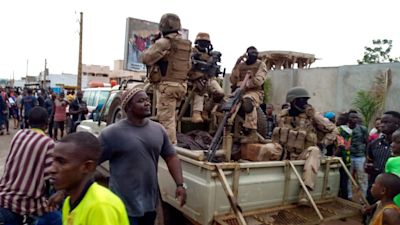Mali's president and prime minister held by mutinous troops in apparent coup

Mutinous soldiers have detained Mali’s president and prime minister in an apparent coup attempt after several months of demonstrations against sitting leader Ibrahim Boubacar Keita.
Soldiers are reported to be moving freely through the streets of the capital city Bamako in a show of power.
A regional official, who spoke on condition of anonymity as they were not authorised to speak to journalists, confirmed that the president and prime minister had been detained on Tuesday evening.
A group surrounded their residence and were seen firing gunshots into the air.
There was no immediate comment from the soldiers, who hail from the very same military barracks in Kati where an earlier coup originated from more than eight years ago.
The dramatic escalation capped off a day of political chaos in the West African nation.
Soldiers deployed in Zimbabwe as unrest continues amid growing food crisis
'People over passports': Johnson says Africans will benefit from Brexit as £620m funding announced
The unrest had kicked off in the garrison town of Kati earlier in the day - when mutinous soldiers took weapons from the armoury and detained senior military officers.
Anti-government protesters cheered their actions, some even setting fire to a building belonging to Mali’s justice minister in the capital.
Prime Minister Boubou Cisse, had urged the soldiers to put down their arms.
"There is no problem whose solution cannot be found through dialogue," he said in an announcement.
Elsewhere on Tuesday, government workers fled their offices as armed men began detaining officials - including the country’s finance minister Abdoulaye Daffe.
President Keita has tried to meet the protesters' demands through a series of concessions since the demonstrations began in June.
The leader, who has broad support from former coloniser France and other Western allies, first came to power in 2013 when he won more than 77% of the vote in a democratic election.
France and the UN have spent more than seven years trying to stabilise Mali since the 2012 coup allowed an Islamic insurgency to take hold in the West African nation.
Tuesday’s developments were immediately condemned by the Economic Community of West African States (ECOWAS). While France and the United States also strongly criticised the move.
"The US is opposed to all unconstitutional changes of government whether in the streets or by security forces," tweeted J Peter Pham, the State Department’s special envoy for the Sahel region.
Tuesday's events are a troubling repeat of the events leading up to the 2012 coup - which unleashed years of chaos in Mali when the ensuing power vacuum allowed Islamic extremists to seize control of northern towns.
The current president has faced growing criticism of how his government has handled the relentless Islamic insurgency engulfing the country - one once praised as a model of democracy in the region.
The military faced a wave of particularly deadly attacks in the north in 2019, prompting the government to close its most vulnerable outposts as part of a reorganisation to try and stem the losses.
Regional mediators have urged President Keita to share power in a unity government but such proposals have been swiftly rejected by opposition leaders.